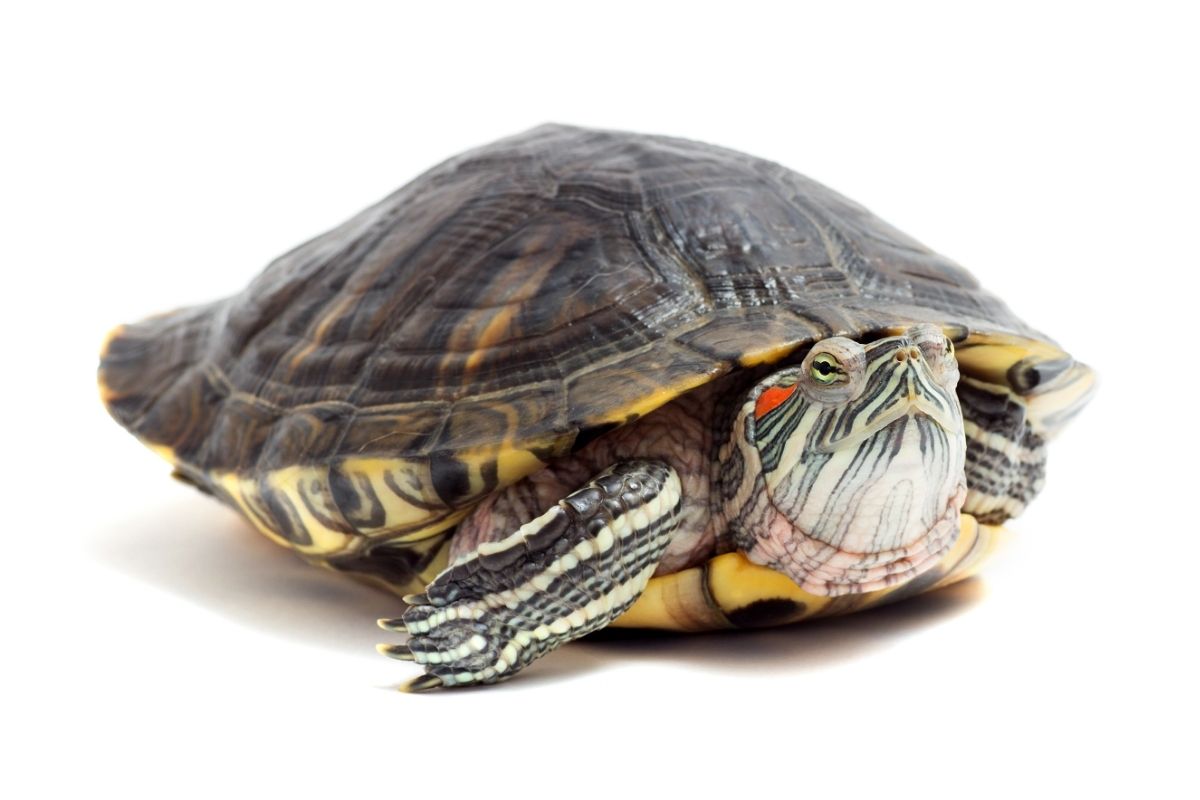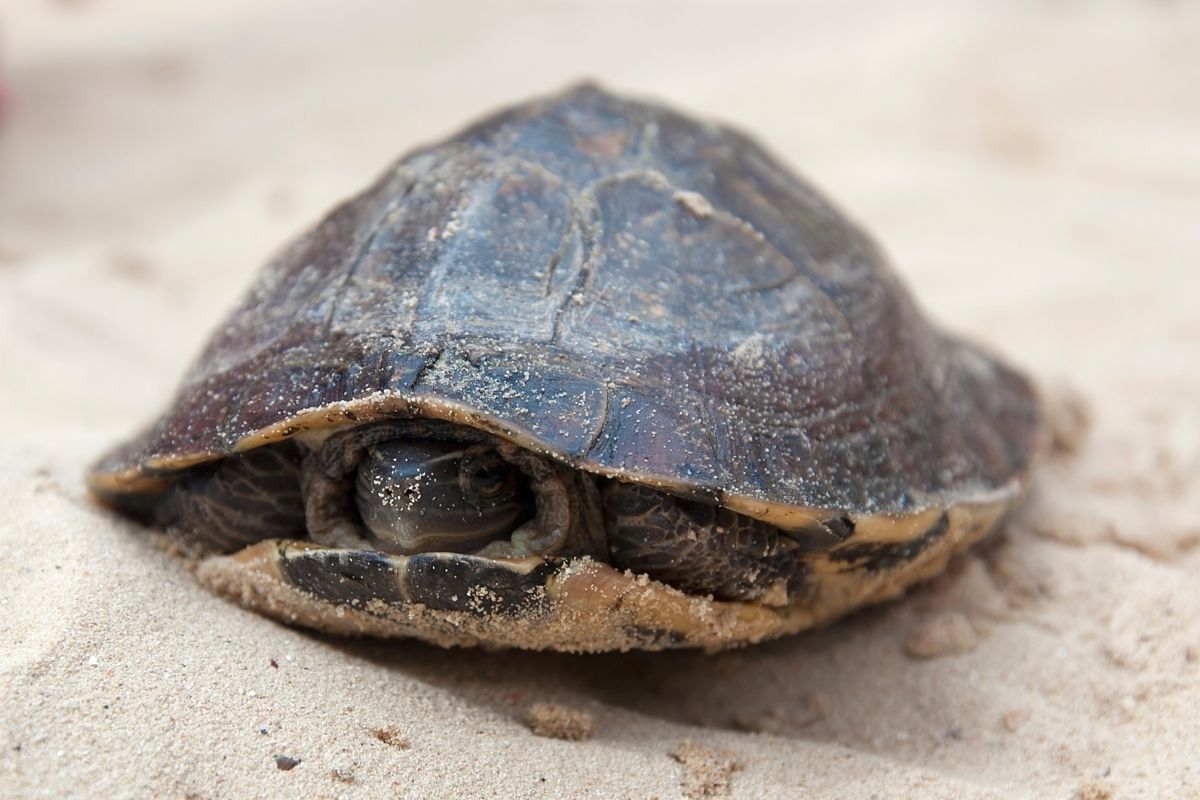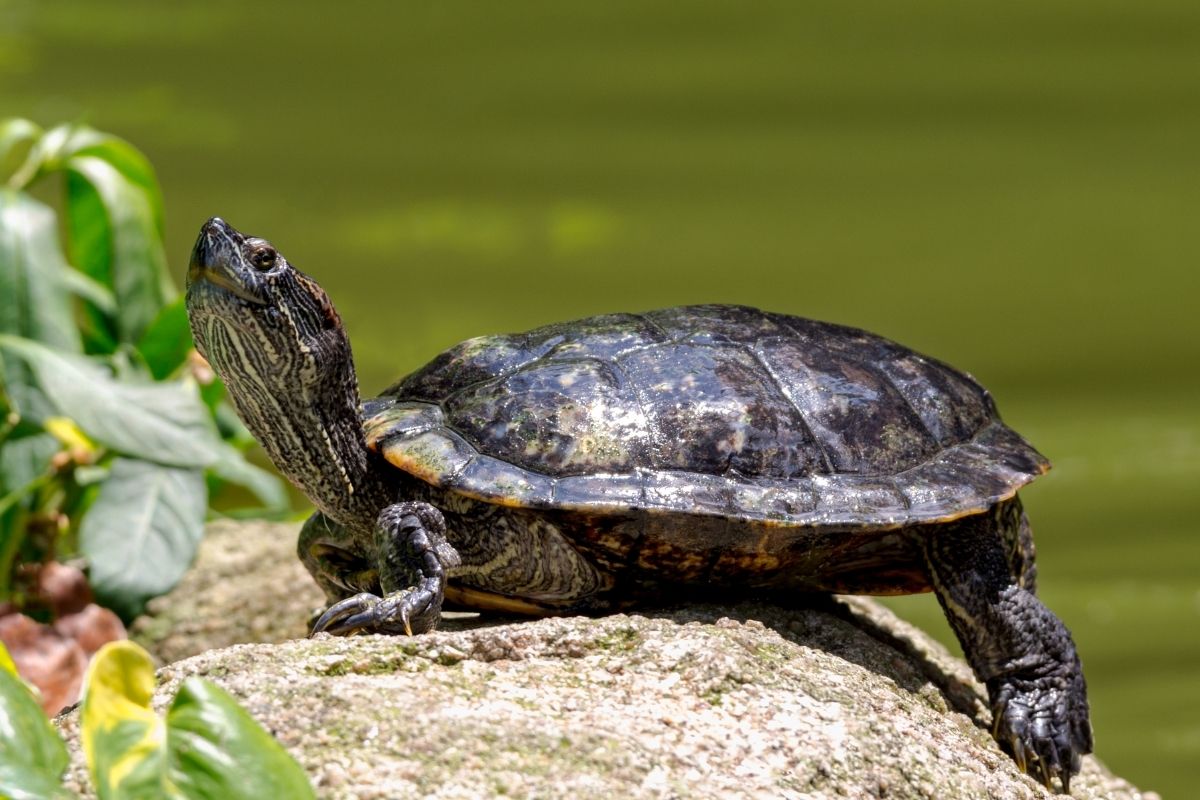Everybody wants their pet to be both happy and healthy but sometimes, it can be difficult to tell.
With turtles especially, understanding their behavior can be difficult and this makes noticing when something is wrong with them very tricky.

It’s easy to miss the warning signs of issues like illness and parasites, so it’s important for you to pay attention to your turtle to spot when they are feeling poorly.
And what’s the best way to do this?
With their poop!
Poop may be gross but when it comes to your pets (not just including turtles) then checking their poop is a great way to see how they’re doing.
A lot of pets will have obvious signs in their behavior, like refusing to eat or shying away, but checking your pet’s poop is also a great way to see if they are healthy and happy.
But how do you know if your turtle’s poop is normal and what’s an obvious sign that something is wrong?
Well, here we are going to be discussing turtle poop and guide you through what is normal and what is not – that way, you can learn how to identify the clear signs of illness when the time comes.
So, let’s jump in and take a closer look at what normal and abnormal turtle poop is like!
Healthy Turtle Poop And What To Expect

So, let’s lay down the ground rules for normal turtle pooping so you know what to expect from your turtle.
This can make it much easier to notice when your turtle’s pooping habits deviate from normal so you can identify potential issues straight away and get your turtle on the road to recovery very quickly.
Frequency
The first thing to note is how frequent your turtle poops.
Baby turtles can poop every single day and as they grow bigger and bigger, they will begin to poop less frequently. A turtle with a shell length of over four inches will poop roughly every three or four days.
It’s important to note that this is just a general guideline and it could be that your turtle poops more regularly or less regularly than normal.
The best thing to do is just to write down or make a mental note of how often your turtle poops so you can keep track of what is normal for your specific turtle.
Once you have that down, you will be able to notice if your turtle’s bowel habits have suddenly changed.
For example, if they are suddenly pooping every single day or have not pooped in a week, then something is clearly wrong.
Color And Consistency
Another thing to look for when inspecting your turtle’s poop is color and consistency.
Turtle poop should be brown or greenish-brown.
The reason why turtle poop can sometimes be greenish-brown is because of the amount of green food in their diet, which can sometimes come through in their feces – so if your turtle sometimes has poops that are greener than others, this could just be because they have eaten a lot of green food recently and this is not something to be concerned about.
As for consistency, turtle poop is usually very solid and appears in an oval, pellet-like shape. If the consistency of your turtle’s poop suddenly changes, then this can be a big sign that something is wrong.
However, if your turtle has pooped in the water, it can be difficult to see what kind of consistency it was when your turtle defecated.
Water will soften the poop but it should not really lose its shape and should still remain in that oval, pellet-like shape.
But, if your turtle has pooped in the water and the poop is soft – don’t worry, that’s normal too!
Size-wise, turtle poop can be very small or rather big – it all depends on your turtle and its size.
There is no ‘normal’ poop size so if your turtle’s poop varies from lots of little pellets one day to a few larger pellets a couple of days later, then that is normal and not a sign of a bigger problem.
What A Healthy Poop Means
So, if your turtle is pooping out solid, brown pellets every few days – then congratulations, your turtle should be both happy and healthy!
The important thing to remember is that each turtle is different and they may deviate from the norm when it comes to their pooping habits.
Keep a note of what their regular schedule is and you should be able to quickly pick up when there’s a big change.
So, now that you know what normal pooping patterns look like for turtles, let’s take a look at some of the issues that may crop up and what they mean.
Unhealthy Turtle Poop And What It Means

Here we are going to take a closer look at some issues your turtle may be experiencing when it comes to pooping.
Most of these issues are very common and with a few simple changes, you can get your turtle back to healthily pooping in no time.
Check out the symptoms below, what they mean, and what you can do to help solve the problems plaguing your poor pet turtle.
Constipation
Constipation is a pretty common problem that can affect turtles from time to time. Even we humans are prone to it but luckily, a few basic changes can help solve this problem in no time.
Constipation occurs when your turtle is pooping less regularly than normal.
You may have noticed that your baby turtle has not pooped in over a day, or your adult turtle in a week – and at this point, it’s time to act fast to save your turtle from any pain or discomfort.
The first thing to try out is giving your turtle a warm bath at least once a day. The water should be lukewarm and not too hot or cold as this could make bath time uncomfortable for your turtle.
The water should be between eighty and ninety degrees Fahrenheit and bath time should last for around ten minutes.
Remember to keep an eye on the water temperature all through these ten minutes to make sure that your turtle is comfortable.
This will give your turtle plenty of time to soak in the warm water and help ease any tummy troubles that are making it difficult for them to go.
Constipation in turtles can be caused by two main reasons.
The first is that your turtle is not eating enough fiber in their diet and while the bath solution should help your turtle relieve itself, it is only a short-term fix and long-term solutions must be brought in to help avoid this problem in the future.
Try adding more fiber to your turtle’s diet to see if their constipation eases.
Foods that contain mineral oil or high-water content like watermelon or pumpkin are a great way to do this. Hopefully, in a few days, you should see your turtle return to its regular bowel habits.
If not and your adult turtle has not defecated in over a week, then it’s time for a visit to the vet as this is a sign that your turtle has an obstructed bowel.
Sometimes, turtles will eat things that they shouldn’t and this can block their bowels, making it difficult or impossible for them to poop.
Without fixing this issue, your turtle will only become more and more ill – and eventually, they will pass away.
This is a common problem with turtles and tortoises. They end up eating the gravel and substrate in their enclosure and block their own bowels.
This condition is known as impaction, and you may notice that your turtle will have also stopped eating or is eating way less food than usual, have been sluggish or are hiding away.
All of these symptoms combined with constipation signal that your turtle is suffering from impaction and needs to see a vet right away.
A vet will x-ray your turtle to see if its bowels are obstructed and walk with you through the solution to this.
They will also offer up solutions to prevent this problem again in the future and do more thorough checks on your turtle if it turns out their bowels are nor obstructed but they are still constipated.
Hopefully, after this, your turtle’s bowels will be cleared and they can go back to being their usual self.
Diarrhea
On the other end of the scale, your turtle may be pooping way more often than usual and this is a condition called diarrhea.
Diarrhea in turtles can be caused by many things but the first (and most common) reason is present in the turtle’s diet – fiber!
Fiber is a great way to encourage your turtle to defecate more often and it’s important that you include plenty of fiber rich foods like fruit into your turtle’s diet so they don’t suffer from constipation.
However, sometimes treating your turtle with too much fiber can mean that they start suffering from diarrhea.
Diarrhea may seem harmless on the surface but actually, diarrhea can cause your turtle to become very ill.
Turtles can become dehydrated if they poop too much and having an unclean enclosure full of poop can lead to bacteria and salmonella growing in the enclosure and potentially infecting your turtle.
Although most turtles are not affected by salmonella themselves, they could potentially pass it on to you or your family through contact.
So, try reducing the amount of fiber-rich foods in your turtle’s diet but make sure they are also drinking plenty of water.
If diarrhea still persists, then the other cause could be invisible worms.
Just like all pets and animals, turtles can pick up worms that live in their stomach and steal food from them, leading to the turtle becoming underfed and seriously ill.
Some worms are visible, but some aren’t and diarrhea is the most common symptom of invisible worms.
If you think that your turtle may be suffering from invisible worms, then take your turtle to the vet with a sample of their most recent poop to diagnose the issue and get treatment as soon as possible.
Another possible cause of diarrhea is a type of infection called Protozoan infection. This infection is caused by a very small type of parasite called Protozoa but they vary in danger when it comes to turtles.
Some turtles are not harmed by them at all, while others are seriously affected by Protozoa.
The way to avoid Protozoa from infecting your turtle is to keep them and their habitat clean.
Bad hygiene will cause them to infect your turtle and spread, so just keep to a strict cleaning schedule to stop any Protozoa infections before they can take place.
If your turtle has an infection, then they will suffer from severe diarrhea and you will need to take them to the vet with a sample of their most recent poop.
White Stringy Poop
These are visible worms if your turtle has been leaving behind long white stringy poops.
Just like invisible worms, visible worms are a parasitic infection that lives inside your turtle’s digestive system and it survives by eating the food your turtle just ate before it can digest it itself.
Another symptom of parasitic infection is that your turtle is eating more than usual or always seems to be hungry – this is because the parasite inside them is stealing away their nutrition and the turtle is effectively being underfed.
There are lots of different types of worms that your turtle could be carrying, like tapeworms or roundworms, so a trip to the vet is a must!
Parasites are usually contracted through your turtle eating contaminated food. To avoid this, serve your turtle fresh food and captive-reared prey so they are not picking up anything from a creature in the wild.
A serving dish is also a great way to keep your turtle’s food clean while eating (this is also great for reducing the chances of impaction too!).
Your vet will be able to identify the type of parasite infecting your turtle and administer the appropriate medicine needed to kill the parasites and purge them from your turtle. After a while, your turtle will be back to normal.
Dark Black Poop
Black poop is never a good sign as it usually means that the poop contains blood. As a result, your turtle pooping dark black pellets may mean that their internal system is damaged and needs immediate care.
This problem is fairly common because, as we said earlier, turtles love to eat things that they shouldn’t and if what they have eaten hasn’t blocked their bowels, then it has definitely damaged them.
Turtles will sometimes try to eat and digest sharp objects that can cut up their insides and cause them to bleed internally.
This will lead them to defecate black poops and on closer inspection, you may still be able to find fresh red blood in there too.
This is called bowel perforations and any kind of object could be the cause – glass, plastic, and even soft wool can seriously damage your turtle’s internal organs and cause them to bleed in their poop.
If you notice this issue, do not wait around – contact your vet immediately and get your turtle there as fast as possible.
The vet will not only have to remove the object from inside your turtle, but also seal up the damage there to stop your turtle from becoming even more ill and potentially dying.
From there, the vet will walk you through a recovery plan and advise you on what to remove from your turtle’s enclosure.
If you allow your turtle to wander around your home, only do so with proper supervision.
This way, your turtle cannot try to eat something they shouldn’t be behind your back – and this can stop them from damaging themselves internally again.
Pooping When Handled
You may have noticed that your turtle always seems to poop or pee whenever you pick them up or try to handle them. While this can be seriously annoying, it’s also a very important sign that you should not miss.
Some turtle owners call this poop the ‘Protest Poop’ as it is a sign that your turtle doesn’t like to be picked up and handled.
In reality, this poop is actually a sign of high stress in your turtle and you should not ignore it and continue handling your turtle.
Stress is a big killer with turtles as it can be caused by lots of different things and it varies from turtle to turtle.
One turtle might love being handled, but others despise it, and being handled can seriously stress them out. Stress can then lead to other issues like refusing to eat or hiding, and eventually can become a cause of death.
However, sometimes handling your turtle is unavoidable and you need to move them so you can clean their enclosure.
In this case, then nothing can really be done, but if you are annoyed that your turtle keeps pooping on you every time to pick them up for a cuddle or to give them some attention – then sorry, but you really should listen to your turtle and put them back down.
White Poop
White poop is a tricky one because for some species of turtle, white poop is completely normal.
White poop is caused by uric acid and this is commonly found in tortoises and some land turtle species.
Uric acid is a by-product that some reptiles naturally produce and when they defecate, it leaves the body too in the form of a white paste that can resemble milk.
This paste-like white poop is normal for land turtles and as long as it is not long and stringy, there is usually nothing to worry about here.
Aquatic turtles usually do not produce uric acid and thus, they normally do not produce paste-like white poops.
Conclusion
So whether it’s dietary requirements, intestinal parasites, or foreign objects blocking your turtle’s bowels – your turtle’s poop is a great way to see if they are happy and healthy.
Most illnesses or injuries will cause your turtle to change their bowel pattern or the way their poop looks or feels, so keeping a close eye on their poops is a great way to keep an eye on your turtle’s health.
While this may be gross to some, it’s perfect to pick up the early warning signs of big issues before it makes your turtle seriously ill.
So, take note of your turtle’s pooping habit so you can be prepared to pick up the signs and get treatment as soon as possible. This way, you can keep your turtle happy and healthy!
